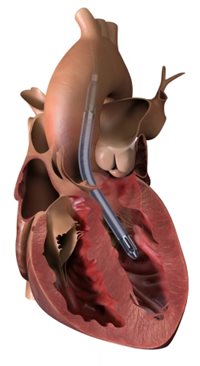A patient at Catholic Medical Center (CMC)’s New England Heart & Vascular Institute was recently the first in New Hampshire to receive a state-of-the-art cardiac device.
The Impella 5.5 provided critical support for a 57-year-old patient who underwent emergency heart surgery. The patient needed a bypass and valve repair, and his heart was very weak after surgery. The Impella 5.5, a left ventricular assist device, helped provide blood flow while the heart healed.

The Impella 5.5 can be implanted through a small incision under the collarbone and is just as easily removed once the patient’s heart recovers.
“Sometimes after surgery, the heart is weak and needs to be supported,” says
Dr. David Caparrelli, the cardiac surgeon who performed the procedure. “In the past we would use medications that, while supporting the heart and blood pressure, can cause damage to other organs like the kidneys. The Impella 5.5 allows us the opportunity to decrease those medications and prevent that potential damage.” According to Caparrelli, the device was only needed for a short time and the patient’s condition continues to improve.
While previous versions of this device have been used for years, the Impella 5.5 provides a higher flow rate than ever before and is easier to implant. According to
Dr. Stephan Heo, interventional cardiologist at CMC, “Because of the high flow rates, this new device can be used not only after heart surgery, but also to support patients following a severe heart attack, or patients who have heart failure for other reasons such as post partum cardiomyopathy and ‘broken heart syndrome.’ This provides a great opportunity for heart surgeons and cardiologists to work together on high risk, complex patients and to provide a high level of cardiac care for our patients.”
The
New England Heart and Vascular Institute at CMC is dedicated to bringing the most cutting edge multidisciplinary care to the patients of New Hampshire and all of Northern New England.
The illustration shows the Impella 5.5 with SmartAssist placed in the heart. (Image courtesy of Abiomed)